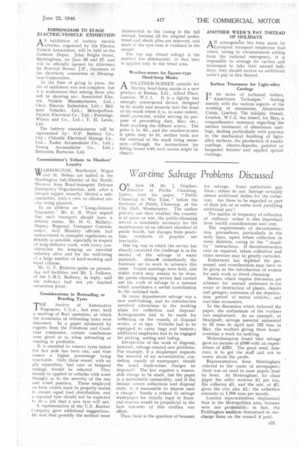War-time Salvage Problems Discussed O N-lune 14, Mr. J. Stephen, Director
Page 23

If you've noticed an error in this article please click here to report it so we can fix it.
of Public Cleansing, Luton, read his paper, " Public Cleansing in War Time," before the Institute of Public Cleansing, at the City Hall, Westminster. The author pointed out that whether the country is at peace or war, the public-cleansing service is absolutely necessary for the maintenance of an efficient standard of public health, but changes from peacetime standards of practice are inev itable.
One big way in which the service has already answered the challenge is in the matter of the salvage of waste materials. Almost immediately the Institute set to work to advance this cause. Centre meetings were held, and whilst much may remain to be done, the public-cleansing service had carried out the work of salvage in a manner which constitutes a useful contribution to the national task.
In many departments salvage was a new undertaking, and its introduction involved alterations in the working plans for collection and disposal. Arrangements had to be made for collecting on the rounds, at disposal works, or at tips. Vehicles had to be equipped to carry bags and baskets; additional employees had to be engaged for nicking, sorting and baling.
Irrespective of the work of disposal, however, salvage created new problems. For example, if a shopkeeper requests the removal of an accumulation consisting mainly of wastepaper, should the usual trade-refuse charges be imposed? The law requires a reasonable charge to be made, but the paper is a marketable commodity, and if the income covers collections and disposal costs, is it reasonable to impose such a charge! Surely a refusal to salvage wastepaper for strictly legal Or financial reasons would be prejudicial to the best interests of this civilian war effort.
Then there is the question of bonuses for salvage. Some authorities pay these ; others do not. Salvage certainly means additional duties for the collectors. Are these to be regarded as part of their job, or as extra work justifying additional pay: The matter of frequency of collection of ordinary refuse is also important from health considerations and cost.
The requirements of decontamination precautions, particularly in the early days, upset refuse collection in some districts, owing to the " standby " instructions. If decontamination ever be required, refuse collection and other services may be greatly curtailed.
Enlistment has depleted the personnel, and consideration may have to be given to the introduction of women for such work as street cleansing.
Matters which require discussion are schemes for mutual assistance in the event of destruction of plants, .depots and garages; extension of the depreciation period of motor vehicles; and war-time economies.
In the discussion which followed the paper, the enthusiasm of the workers was emphasized. As an example, at Stockport, salvage material amounted to 51 tons in April and 1= tons in May, the workers giving three hours' overtime a week for nothing.
Wolverhampton found that salvage gave an income of ow with an expenditure of £250. The great need, however, is to get the stuff and not to worry about the profit.
Representatives from Birmingham referred to the waste of newspapers; there was no need to issue papers hour by hour. At Birmingham, for clean paper the seller receives £1 per ton, the collector £1, and the sale, at £3, gives the city also £1; the collection amounts to 1,800 tons per month.
London representatives • emphasized that in the Metropolitan area, bonuses were not permissible; in fact, the Paddington auditors threatened to surcharge them on the council if paid.




























































